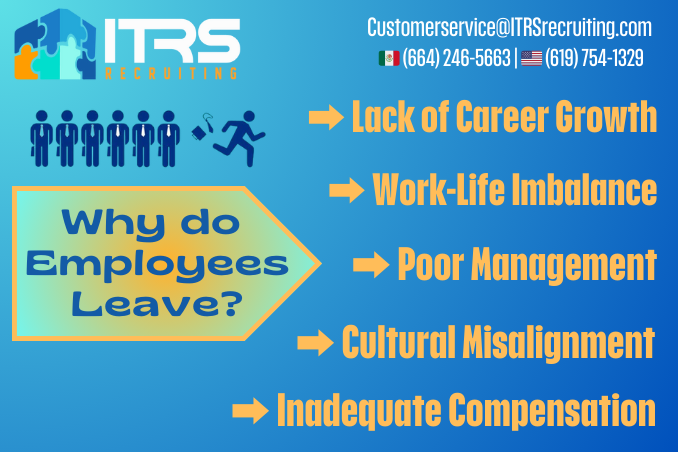Employee Turnover: How to Avoid It and Why It’s Crucial to Understand Why Employees Leave

Employee turnover is one of the most significant challenges companies face, regardless of their industry or size. High turnover can lead to financial losses, a dip in productivity, and a demoralized workforce. Yet, some companies fail to fully address the root causes behind why employees leave. Understanding these reasons is crucial to reducing turnover and building a stronger, more loyal workforce. Here, we explore how to avoid turnover and why it’s essential to uncover the reasons employees exit your organization.
Why Do Employees Leave?
Before focusing on how to avoid turnover, it’s essential to recognize the reasons employees choose to leave. Here are some of the most common factors:
1. Lack of Career Growth Opportunities: Employees often leave when they feel there is no clear path for advancement within the company.
2. Poor Management: Supervisors who micromanage or lack communication skills can create a hostile or unproductive work environment.
3. Inadequate Compensation: Pay that doesn’t match industry standards or the employee’s contribution is one of the top reasons for high turnover.
4. Work-Life Imbalance: Increasing demands without flexibility can lead to burnout, causing employees to seek better work-life balance elsewhere.
5. Cultural Misalignment: If an employee feels they don’t fit within the company’s culture, they are more likely to disengage and ultimately leave.
How to Avoid Employee Turnover
While turnover may never be entirely avoidable, businesses can significantly reduce it by adopting proactive strategies:
1. Offer Career Development and Growth
Investing in employees’ professional growth is one of the most effective ways to keep them engaged. By offering training programs, mentorship, and clear promotion paths, you give employees a reason to envision a long-term future with the company.
2. Improve Management Skills
Leaders play a critical role in employee retention. Companies should focus on training managers to lead with empathy, provide constructive feedback, and support their team members’ professional and personal development. Managers who foster open communication and trust create a work environment where employees feel valued and heard.
3. Ensure Competitive Compensation and Benefits
It’s essential to ensure that salaries and benefits are competitive within the industry. Compensation isn’t limited to salary; it also includes health benefits, retirement plans, bonuses, and perks like flexible working hours or remote work options. Offering these can differentiate your company from competitors and reduce turnover.
4. Promote Work-Life Balance
With rising awareness of mental health and wellness, employees now expect a better balance between their personal and professional lives. Providing flexibility, such as remote work or flexible hours, can help retain talent and avoid burnout. When employees feel their personal lives are respected, they are more likely to stay loyal.
5. Build a Strong Company Culture
An inclusive, supportive, and positive company culture plays a significant role in keeping employees engaged. Team-building activities, celebrating diversity, and fostering a sense of belonging can create an environment where employees feel they’re part of something meaningful.
Why It’s Important to Understand Why Employees Leave
Understanding why employees leave your company is vital for several reasons:
1. Identifying Trends
When employees leave without giving feedback, companies lose the opportunity to address common issues that may be systemic. Conducting exit interviews allows you to identify recurring patterns, such as dissatisfaction with management, compensation, or workplace culture.
2. Reducing Future Turnover
Once you know why employees are leaving, you can implement strategies to prevent the same issues from driving others away. For instance, if employees are leaving because they feel stagnant, consider increasing opportunities for growth and learning.
3. Protecting Your Company’s Reputation
High turnover can negatively affect your brand reputation. Word-of-mouth spreads quickly, especially in today’s interconnected world. Understanding and addressing the reasons for turnover helps maintain a positive reputation as a company that values its employees.
4. Improving Employee Engagement
Employees who see that their feedback is taken seriously are more likely to remain engaged and loyal. When companies act on the information provided in exit interviews or feedback sessions, they demonstrate a commitment to continuous improvement and employee satisfaction.
Conclusion
Employee turnover is a costly issue, but it can be mitigated through deliberate actions and a keen understanding of why employees leave. By creating a supportive work environment, offering career development opportunities, and ensuring fair compensation, companies can retain top talent
